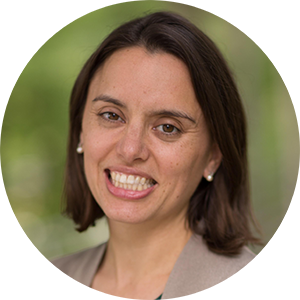
This week's Faculty Spotlight shines on Monica Lemmon, MD, assistant professor of pediatrics in the Division of Neurology. Lemmon talks to us about how, during recruitment, she was immediately impressed by the collaborative spirit at Duke, and how she knew she wanted to be a doctor since the age of 6. She also discusses her work as the director of Duke’s Fetal and Neonatal Neurology program and how she particularly enjoys the opportunity to work with families longitudinally from pregnancy through early childhood. She also talks about her current research interests and how her most significant mentor helped her learn how to balance competing demands.
How long have you been at Duke? How did you decide to come here?
I’ve been at Duke for 4 years. During my recruitment, I was immediately struck by the collaborative spirit of the place. My clinical and research portfolio requires multidisciplinary and interprofessional collaboration. The breadth of faculty within the health system and university offered a unique potential for meaningful collaboration across disciplines.
What are your current responsibilities within the Department of Pediatrics? What does your typical day look like?
My time is split between research, teaching, and clinical care. The bulk of my time is devoted to research, and I’ve recently started teaching Clinical Bioethics & Health Policy for the Duke Science and Society Initiative. On a typical day, I get to interact with a wide range of people, including patients, research participants, collaborators, and students.
How did you first get interested in medicine? What made you decide to pursue pediatric neurology in particular?
My parents tell a story of 6-year-old me calling a “family meeting” to share that I intended to become a doctor and attend Duke medical school. My interest in child neurology was less planned. In my 4th year of medical school (a month or so before residency applications were due), I did a sub-internship in child neurology. I spent 3 days in clinic and felt immediately drawn to the disease processes, patient-family relationships, and ethical challenges that define the field.
What are your specific interests in the field of pediatric neurology? What do you enjoy most about your work?
I direct Duke’s Fetal and Neonatal Neurology program and primarily serve patients and families impacted by neurologic conditions that present in utero or during the neonatal period. A highlight of my field is the opportunity to work with families longitudinally through pregnancy, the neonatal course, and early childhood. I also love working with Duke’s Neonatal Intensive Care Nursery (NICN) collaborative, which is a multidisciplinary group of clinicians committed to improving the outcomes of neonates at neurodevelopmental risk.
Is there any research or other special projects you are doing or plan on doing?
My research portfolio spans 3 primary areas: 1) Decision making for critically ill children, 2) Patient-clinician communication, and 3) Stakeholder engagement in research. We have a variety of studies ongoing, including a longitudinal study of decision making for infants with neurologic conditions here at Duke.
Who was your most significant mentor and what knowledge did you gain through this collaboration?
I’ve been fortunate to have incredible, engaged mentors and sponsors throughout my career. The most influential of these has probably been Dr. Renee Boss, a talented bioethicist and clinician researcher with interests in neonatal decision making. She helped me transition towards my current research agenda, has served as a sponsor throughout my career, and continues to help me think about how to balance competing demands.
Do you have any advice for trainees?
One of the biggest challenges I faced as a trainee and now face as faculty is figuring out how to balance competing demands and opportunities. A mentor of mine (see above!) shared the following:
Create a personal mission statement - Write 1-2 sentences about the type of impact you’d like to have in your work and in your community. As opportunities arise, think about whether they get you closer to or farther away from your mission.
What passions or hobbies do you have outside of work?
There’s nothing I enjoy more than spending time with my witty husband and two spirited children (6 and 2). We love getting outdoors, board games, and dance parties. My daughter and I share a love of music and musical theatre. She recently drew up plans for a stage she’s hoping to build in our playroom.